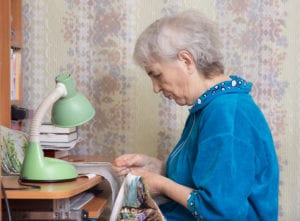Four Behavior Changes You’re Likely to See in Someone with Dementia
Updated on 03/07/2022
Dementia means lots of changes for your senior and for you. Some of the biggest changes that you see are the ones that affect her behavior and how she interacts with her own needs. As dementia worsens, some of these behaviors will also worsen and change, which can lead to you finding other ways to help her to accommodate her needs and her wants.
More Frequent Confusion
Confusion is something that everyone experiences now and again, but dementia means that your elderly family member may find more and more situations that are confusing for her. She might find it difficult to retain information or to learn new information. Language can also become more difficult for your senior, which can meant that it’s more difficult for her to express to you what she needs or wants at any given moment.
Wandering
Wandering is a complicated set of behaviors. Your elderly family member might be bored or she might be trying to meet a need that she doesn’t fully understand. These types of situations can trigger an urge to seek a solution, which makes your senior’s movements a little more unpredictable. It helps to set up some solid routines for your elderly family member, in which you do what you can to anticipate her needs.
Eating Differently
Changes in how your senior’s brain works, means that she experiences changes in other things, too, like how she approaches eating and food. She might not even think about eating because hunger cues might not mean anything to her. She also might have a more difficult time choosing foods that give her the nutritional content that she truly needs.
Approaching Hygiene Differently
Just as with other aspects of her life, your elderly family member is going to experience hygiene differently. She may not think about bathing or changing her clothes the same way that she did in the future. Her sense of smell may not work the same and she may not think of hygiene tasks as anything that is necessary at all.
You might notice other changes in your elderly family member’s behavior, too. It’s important to remember that she’s not doing these things to upset you or to aggravate you. She can’t control these changes or how quickly they arise. Elderly care providers can help both you and your aging adult to learn ways to cope with these situations as they crop up.
If you or an aging loved-one are considering in-home elderly care in Lakeland, FL, please contact the caring staff at Helping Hands Nursing Services today. To learn about our affordable rates and obtain a FREE assessment for your loved one, call (863) 616-1888
By Helping Hand Nursing ServicesReviewed By Audra Gold Read Time 5 minutes Posted on 02/22/2019
